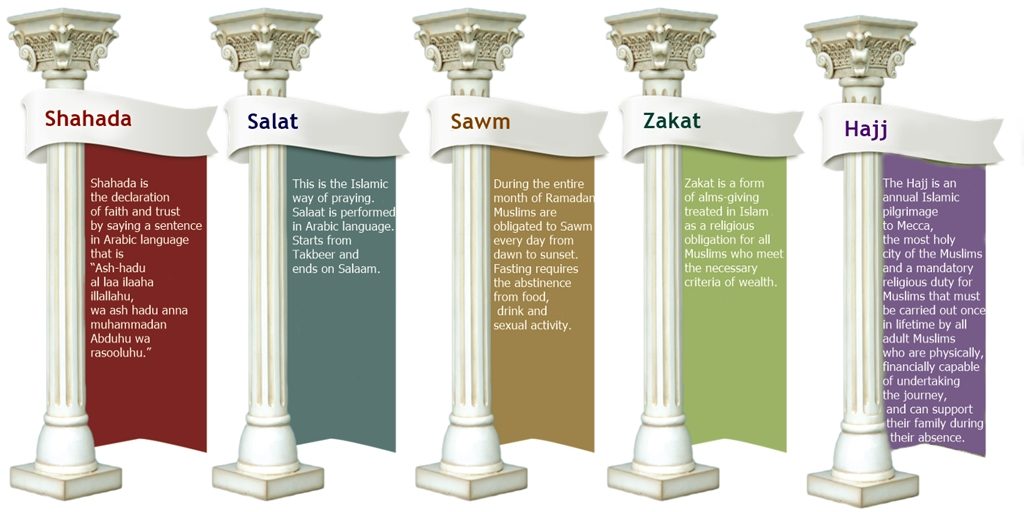Pillars of Islam: The Five Fundamental Practices of the Muslim Faith
The Pillars of Islam are the five fundamental practices that are essential to the Muslim faith. These pillars, which form the foundation of Islam, are considered to be the most important aspects of a person’s relationship with God. These practices are considered to be the core principles of Islam, and are essential for all Muslims to follow in order to live a righteous and fulfilling life.
-
The Declaration of Faith (Shahada)
The Shahada is a powerful statement that affirms a person’s belief in the oneness of God and the prophethood of Muhammad. It is a declaration of faith that is meant to be recited with conviction and sincerity, and it is a statement that embodies the belief in the oneness of God and the prophethood of Muhammad. The Shahada is a powerful expression of a person’s commitment to the faith, and it is a declaration that is meant to guide a person’s actions and behavior throughout their life.
The importance of the Shahada lies in its affirmation of the fundamental principles of Islam. It is a declaration of faith that is meant to be recited with conviction and sincerity, and it is a statement that embodies the belief in the oneness of God and the prophethood of Muhammad. The Shahada is a powerful expression of a person’s commitment to the faith, and it is a declaration that is meant to guide a person’s actions and behavior throughout their life.
By reciting the Shahada, a person is expressing their belief in the oneness of God and the prophethood of Muhammad. They are also affirming their commitment to living according to the teachings of Islam and following the path that has been laid out for them. The Shahada is a powerful statement of faith, and it is a declaration that is meant to guide a person’s actions and behavior throughout their life.
-
Prayer (Salat)
Prayer, or Salat, is an essential part of the Muslim faith, and it is a time for a person to connect with God and express their devotion to Him. Muslims are required to pray five times a day, at specific times determined by the position of the sun. These prayers are typically performed in a mosque, although they can also be performed in any other clean and appropriate location. During prayer, Muslims follow a specific set of movements and recite certain verses from the Quran.
The importance of prayer in Islam cannot be overstated. It is a way for Muslims to connect with God and express their devotion to Him. It is also a way for Muslims to demonstrate their submission to His will and their reliance on Him for guidance and support. Prayer helps Muslims to focus their thoughts and cultivate a sense of inner peace and contentment.
Prayer is an essential part of the Muslim faith, and it is a practice that is meant to be performed with sincerity and devotion. It is a time for Muslims to turn their attention away from the distractions of the world and focus on their relationship with God. Through prayer, Muslims are able to cultivate a sense of inner peace and contentment, and they are able to reaffirm their commitment to the faith.
Prayer is not just a physical act, but it is also a spiritual one. It is a way for Muslims to connect with God and seek His guidance and support. Through prayer, Muslims are able to find solace in times of difficulty, and they are able to find strength and inspiration to face the challenges of life.
-
Charity (Zakat)
Charity, or Zakat, is a mandatory form of giving to those in need, and it is considered to be an act of worship. Muslims are required to give a certain percentage of their wealth to those who are less fortunate, in order to help them meet their basic needs and improve their quality of life. Zakat is typically calculated based on a person’s net worth, and it is typically paid on an annual basis.
The importance of charity in Islam cannot be overstated. It is a way for Muslims to demonstrate their compassion and concern for those who are less fortunate, and it is a way for them to fulfill their duty to care for their fellow human beings. Charity helps to build a sense of community and solidarity among Muslims, and it is a way for them to express their gratitude to God for the blessings they have received.
Charity is an act of worship in Islam, and it is considered to be a way for Muslims to demonstrate their devotion to God and their commitment to living according to the teachings of the faith. By giving to those in need, Muslims are able to show their compassion and concern for their fellow human beings, and they are able to fulfill their duty to care for those who are less fortunate.
In addition to its spiritual benefits, charity also has practical and social benefits. By giving to those in need, Muslims are able to help others to meet their basic needs and improve their quality of life. Charity helps to reduce poverty and inequality, and it helps to build a sense of community and solidarity among Muslims.
-
Fasting (Sawm)
Fasting, or Sawm, is the fourth of the Pillars of Islam. It is a period of abstention from food, drink, and other physical pleasures during the daylight hours of the month of Ramadan. Fasting is considered to be a way for Muslims to purify their bodies and minds, and to demonstrate their devotion to God. It is also a time for Muslims to show solidarity with those who are less fortunate, and to practice self-discipline and self-control.
The importance of fasting in Islam lies in its spiritual and physical benefits. Fasting helps Muslims to cultivate a sense of self-control and discipline, and it helps them to develop a stronger sense of spiritual awareness. It is a time for Muslims to focus on their relationship with God, and to seek His guidance and support.
Fasting is also a way for Muslims to show solidarity with those who are less fortunate, and to practice compassion and generosity. It is a time for Muslims to reflect on the blessings that they have received, and to express their gratitude to God for those blessings.
-
Pilgrimage (Hajj)
Pilgrimage, or Hajj, is the fifth and final of the Pillars of Islam. It is a once-in-a-lifetime obligation for all Muslims who are physically and financially able to undertake it. The pilgrimage to Mecca is considered to be the holiest site in Islam, and it is a time for Muslims to reaffirm their faith and make a spiritual connection with God. During the pilgrimage, Muslims follow a specific set of rituals and perform certain acts of devotion, such as circling the Kaaba and walking between the hills of Safa and Marwa.
The importance of the Hajj lies in its spiritual significance and its role as a unifying force among Muslims. The pilgrimage to Mecca is a time for Muslims to reaffirm their faith and make a spiritual connection with God. It is also a time for Muslims to demonstrate their devotion to God and their commitment to living according to the teachings of Islam.
The Hajj is a time for Muslims to come together and share in the experience of making the pilgrimage to Mecca. It is a time for Muslims to learn from one another and to strengthen their bonds of brotherhood and sisterhood. The Hajj is a unifying force among Muslims, and it helps to reinforce the sense of community and solidarity that is so central to the Muslim faith.
In conclusion, the Pillars of Islam are the five fundamental practices that form the foundation of the Muslim faith. These pillars are considered to be the most important aspects of a person’s relationship with God, and they are essential for all Muslims to follow in order to live a righteous and fulfilling life. The Pillars of Islam are the Declaration of Faith, Prayer, Charity, Fasting, and Pilgrimage, and they are practices that are meant to guide a person’s actions and behavior throughout their life. By following these pillars, Muslims are able to strengthen their faith and deepen their connection with God, and they are able to live a life that is guided by the principles of Islam.





